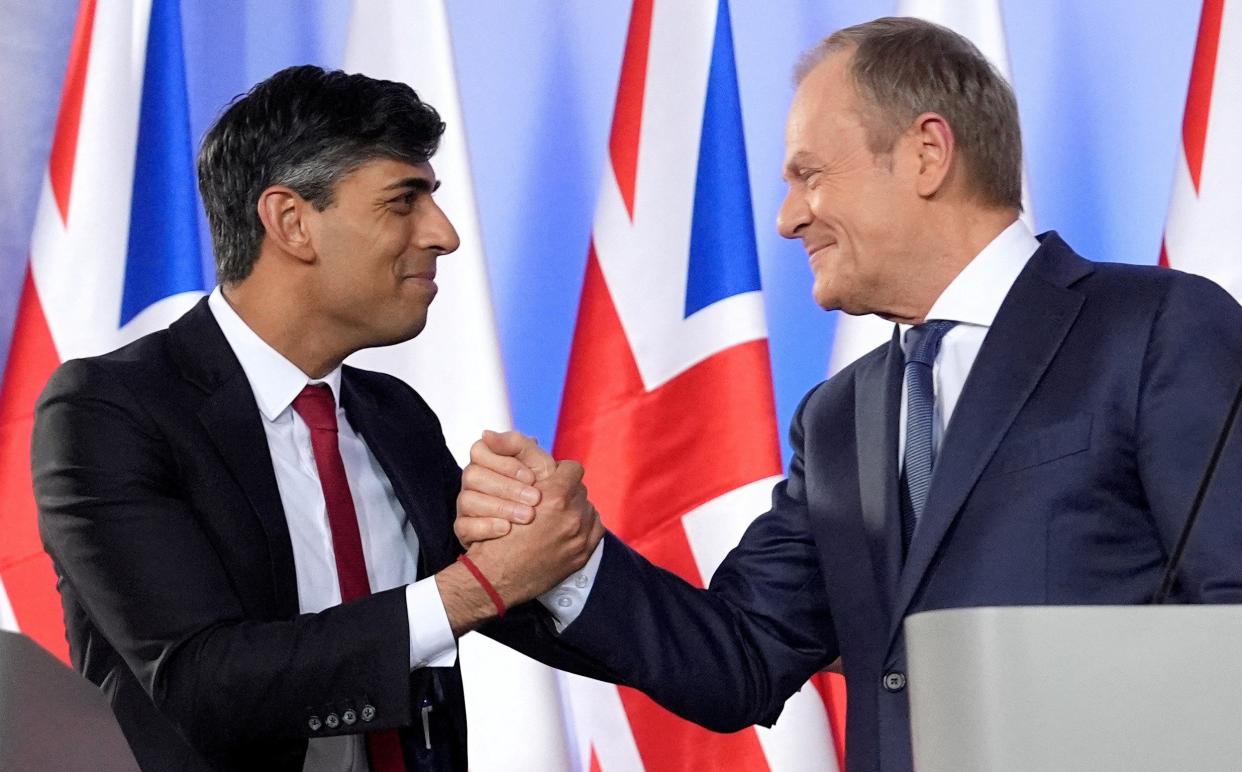Big boost to defence reflects the new dangers facing Britain

The passing reference to defence in the March Budget drew criticism of the Government at a time of heightened international tension. The Chancellor said that current spending of just over 2 per cent of GDP would increase to 2.5 per cent “as soon as economic conditions allow”. It appears they now do.
In a commendable display of the seriousness of his intent, Rishi Sunak travelled to Warsaw to unveil a rolling programme of increased military spending amounting to some £75 billion by 2030. The Prime Minister said that it would fulfil the pledge to spend 2.5 per cent of national income on the Armed Forces and ensure that the UK remains the second largest contributor to Nato after the US.
It also forestalled any criticism that Britain is falling behind when he visits Berlin today. Germany’s chancellor Olaf Scholz has pushed his country’s spending up to 2 per cent of GDP and was set to overtake the UK. After decades of failing to pull its weight as Europe’s biggest economy, it is about time Germany stumped up. The Americans have been pressing Europe to spend more on its own defence for years and the possible re-election of Donald Trump to the White House will not lessen the call. It is encouraging to see that they are finally being heeded.
Under Mr Sunak’s plan, not only will core funding rise but it will be accompanied by a significant boost to domestic munitions production, with the defence industry placed on a “war footing”. Long-term contracts will provide jobs and modern weaponry, while radical reforms of procurement are promised to end the waste that has dogged the MoD for decades.
These are all welcome developments which reflect the worsening international situation, probably the most dangerous since the end of the Cold War when at least 3 per cent of GDP went to the military. The defeat of the Soviet Union was an excuse to cut spending and cash in the so-called “peace dividend”, used by successive governments to boost social and welfare programmes. Are these now to be cut back in order to fund defence and, if not, why not?
The Prime Minister also announced another £500 million for Ukraine as part of the “largest ever” provision of UK equipment to Kyiv. This is on top of £2.5 billion already allocated for this year and follows the unblocking of a US aid package worth more than £40 billion. That money was only released after a lengthy bipartisan stand-off in Washington with no certainty it will be repeated.
Jens Stoltenberg, Nato’s secretary-general, said that Ukraine was beginning to receive the support it desperately needs, though it is questionable whether it is enough to help it defeat Russia or merely to continue a stalemate. Nato is now considering a multi-year financial commitment to Ukraine so it can plan its future dispositions, but this will almost certainly be European, not US, led.
The Ukraine war has exposed the parlous position of the UK’s Armed Forces and made a big rise in spending essential. The Army is too small and ill-equipped to conduct overseas combat operations at any meaningful level. The Royal Navy has two 65,000-ton aircraft carriers that have neither the manpower nor the planes to make them fully operational, while the Royal Air Force is desperately short of combat aircraft.
It is at least debatable whether the Government should revisit the Integrated Defence Review, completed in 2021 and refreshed last year. Mr Sunak said that it had accurately predicted the emergence of threats and identified key players like Russia and China.
But it derives from a time before the invasion of Ukraine and a further assessment of the country’s defence needs and strategic ambitions may be in order. Some Conservatives, including Grant Shapps, the Defence Secretary, want to see an even bigger rise in spending to 3 per cent of GDP, which would inevitably require cuts elsewhere.
Politicians need to be far more straightforward with voters about the ramifications of higher defence spending. At the forthcoming general election, Britain’s security must be a central issue between the parties, supplanting the usual arguments over who will spend more on benefits or an unreformed NHS.
The country’s defences can no longer be sacrificed on the altar of an ever-expanding welfare state.

 Yahoo News
Yahoo News 
